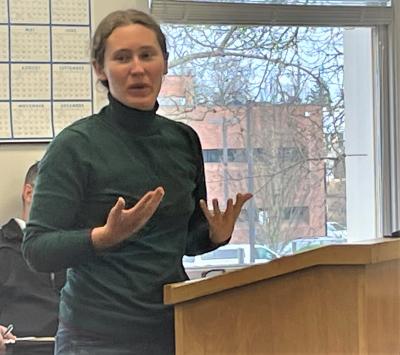Commissioners get update on controlling weeds
ALBANY — Linn County prides itself on being the “grass seed capital of the world”, but not every grass is a good grass.
In fact, certain grasses are considered weeds, OSU Extension crop specialist Christy Tanner told Linn County Commissioners Will Tucker and Sherrie Sprenger Tuesday morning.
Tanner updated the commissioners — Chairman Roger Nyquist was not present — on her work studying methods to control “roughstalk bluegrass” in mid-valley grass seed fields.
Tanner said weeds are harmful in two key ways — they rob the soil of vital nutrients and water that could feed grass seed crops, ultimately reducing yields and weed seeds contaminate “good” seed that can lead to reduced harvest prices and increased seed cleaning costs.
Roughstalk bluegrass is a cool-season perennial grass (which means it can germinate for several years in a row) that is commonly found in the Midwest.
Tanner said it is unknown how it got to the mid-valley, although some believe it was transported here on farm equipment.
It thrives in wet, cool climates like Oregon.
Tanner said some of her projects focus on identifying roughstalk bluegrass infestations with a drone and high-definition camera that can differentiate many spectrums of colors and infrared. Roughstalk bluegrass appears to have a “neon green” color.
Tanner said OSU research is also looking at which herbicides are most effective with roughstalk bluegrass control as well as advanced methods to apply herbicides (weed killing chemicals).
Those methods include used a drone equipped with a camera and GPS system to pinpoint roughstalk bluegrass plants and matching the data compiled with high-tech spraying equipment that directs the herbicide on only the weed and beneficial neighboring grasses, or to only spray between crop rows.
Tanner also talked about vole infestations, a common problem in the mid-valley.
She is also using a drone and camera system to pinpoint heavy vole crop damage and is seeing a 90% accuracy rate.
Linn County residents approved formation of a taxing district in 2008 to help support OSU Extension Service programs and OSU Extension-Linn County is housed in a building in Tangent owned by Linn County and shared with a Linn County Sheriff’s Office substation.
In other business, the commissioners:
- Learned there were 27 males and 27 females born in the county in December and 146 deaths. Reporting by telephone, Dr. William Muth also said there were 620 COVID-19 cases reported.
- Were informed by Environmental Health manager Shane Sanderson that his staff inspected 47 food service operations and 256 year-to-date.
- Reappointed James Branson and Matt Newquist to the Linn County Developmental Disabilities Advisory Board.
- Approved transportation applications for a Small Urban grant of $318,600 for the City of Albany’s paratransit, Call-a-Ride and senior/disabled transportation. Also approved application for Statewide Block Grants: City of Albany, $9,244; City of Lebanon, $40,760; City of Lebanon Capital Stop Improvement, $33,021; Oregon Mennonite Services, $9,691; Sunshine Industries, $23,330; Senior Citizens of Sweet Home, $197,406; Linn Shuttle, $131,454; Dial-a-Bus purchase, $157,028.
- Approved shifting the remaining $1 million due on the $10 million loan from the Road Fund to purchase the former International Paper mill site at Millersburg to a four-year loan at approximately $202,406 per year. The loan may be paid off earlier as funds are generated by the intermodal facility or businesses that lease space at the property.
- Announced that the Jan. 24 meeting will be held at 9:30 a.m. at the Linn County Fair & Expo Center due to a land use hearing.
Media contact: Alex Paul, Linn County Communications Officer, 541-967-3825 or email apaul@co.linn.or.us.

